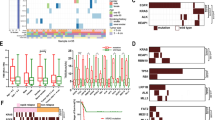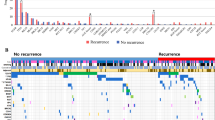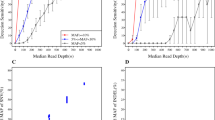Abstract
Purpose
Identification of non-small cell lung carcinoma (NSCLC) patients at high-risk for recurrence after complete resection would potentially direct surveillance frequency and administration of adjuvant treatments. Genetic profiling of tumors could provide clinicians with information regarding recurrence risk. Conflicting evidence exists regarding EGFR, KRAS, and TP53 mutations as prognostic for recurrence. We aimed to test such mutations for prognostic significance in a cohort of early-resected NSCLC specimens.
Materials and methods
Formalin-fixed paraffin-embedded stage I NSCLC specimens resected in our institute during 1988–2008 were sampled. DNA was extracted and a panel of common EGFR, KRAS, and TP53 mutations was tested using a mass-spectrometry-based technique. Clinical data were extracted from patients’ files.
Results
A total of 96 NSCLC stage I patients were included in this study. EGFR mutation frequency of 15.6 %, KRAS mutation frequency of 15.6 %, and a TP53 mutation frequency of 6.2 % were found. A nonsignificant trend for longer relapse-free survival (RFS) was seen for patients with an EGFR mutation, and a nonsignificant trend for worse RFS was found for patients with a KRAS mutation.
Conclusion
EGFR mutation and KRAS mutation were not found to be prognostic for RFS in our cohort of early NSCLC. Larger cohorts and a broader genetic screen for mutations are required.


Similar content being viewed by others
References
Jemal A, Bray F, Center MM, Ferlay J, Ward E, Forman D. Global cancer statistics. CA Cancer J Clin. 2011 Mar-Apr;61(2):69–90.
Tambo Y, Kasahara K, Sone T, Kimura H, Sakai A, Araya T, et al. Prognostic and predictive impact of EGFR and K-ras mutation, and EGFR gene copy number in patients with advanced non-small cell lung cancer (NSCLC) who received first-line cytotoxic chemotherapy. J Clin Oncol. 2009;27:15 S. Abstract no. 8096.
D’Angelo SP, Janjigian YY, Ahye N, Riely GJ, Chaft JE, Sima CS, et al. Distinct clinical course of EGFR-mutant resected lung cancers: results of testing of 1118 surgical specimens and effects of adjuvant gefitinib and erlotinib. J Thorac Oncol. 2012 Dec;7(12):1815–22.
Chau NG, Perez-Ordonez B, Zhang K, Pham NA, Ho J, Zhang T, et al. The association between EGFR variant III, HPV, p16, c-MET, EGFR gene copy number and response to EGFR inhibitors in patients with recurrent or metastatic squamous cell carcinoma of the head and neck. Head Neck Oncol. 2011;3:11.
Kosaka T, Yatabe Y, Onozato R, Kuwano H, Mitsudomi T. Prognostic implication of EGFR, KRAS, and TP53 gene mutations in a large cohort of Japanese patients with surgically treated lung adenocarcinoma. J Thorac Oncol. 2009 Jan;4(1):22–9.
Marks JL, Broderick S, Zhou Q, Chitale D, Li AR, Zakowski MF, et al. Prognostic and therapeutic implications of EGFR and KRAS mutations in resected lung adenocarcinoma. J Thorac Oncol. 2008 Feb;3(2):111–6.
Koga T, Takeshita M, Yano T, Maehara Y, Sueishi K. CHFR hypermethylation and EGFR mutation are mutually exclusive and exhibit contrastive clinical backgrounds and outcomes in non-small cell lung cancer. Int J Cancer. 2011 Mar 1;128(5):1009–17.
Slebos RJ, Kibbelaar RE, Dalesio O, Kooistra A, Stam J, Meijer CJ, et al. K-ras oncogene activation as a prognostic marker in adenocarcinoma of the lung. N Engl J Med. 1990 Aug 30;323(9):561–5.
Mascaux C, Iannino N, Martin B, Paesmans M, Berghmans T, Dusart M, et al. The role of RAS oncogene in survival of patients with lung cancer: a systematic review of the literature with meta-analysis. Br J Cancer. 2005 Jan 17;92(1):131–9.
Tsao MS, Aviel-Ronen S, Ding K, Lau D, Liu N, Sakurada A, et al. Prognostic and predictive importance of p53 and RAS for adjuvant chemotherapy in non-small cell lung cancer. J Clin Oncol. 2007 Nov 20;25(33):5240–7.
Mitsudomi T, Hamajima N, Ogawa M, Takahashi T. Prognostic significance of p53 alterations in patients with non-small cell lung cancer: a meta-analysis. Clin Cancer Res. 2000 Oct;6(10):4055–63.
Steels E, Paesmans M, Berghmans T, Branle F, Lemaitre F, Mascaux C, et al. Role of p53 as a prognostic factor for survival in lung cancer: a systematic review of the literature with a meta-analysis. Eur Respir J. 2001 Oct;18(4):705–19.
Thomas RK, Baker AC, Debiasi RM, Winckler W, Laframboise T, Lin WM, et al. High-throughput oncogene mutation profiling in human cancer. Nat Genet. 2007 Mar;39(3):347–51.
Beasley MB, Brambilla E, Travis WD. The 2004 World Health Organization classification of lung tumors. Semin Roentgenol. 2005 Apr;40(2):90–7.
Rosell R, Moran T, Queralt C, Porta R, Cardenal F, Camps C, et al. Screening for epidermal growth factor receptor mutations in lung cancer. N Engl J Med. 2009 Sep 3;361(10):958–67.
Rosell R, Carcereny E, Gervais R, Vergnenegre A, Massuti B, Felip E, et al. Erlotinib versus standard chemotherapy as first-line treatment for European patients with advanced EGFR mutation-positive non-small cell lung cancer (EURTAC): a multicentre, open-label, randomised phase 3 trial. Lancet Oncol. 2012 Mar;13(3):239–46.
Eberhard DA, Johnson BE, Amler LC, Goddard AD, Heldens SL, Herbst RS, et al. Mutations in the epidermal growth factor receptor and in KRAS are predictive and prognostic indicators in patients with non-small cell lung cancer treated with chemotherapy alone and in combination with erlotinib. J Clin Oncol. 2005 Sep 1;23(25):5900–9.
Ohashi K, Maruvka YE, Michor F, Pao W. Epidermal growth factor receptor tyrosine kinase inhibitor-resistant disease. J Clin Oncol. 2013 Mar 10;31(8):1070–80.
Shepherd FA, Domerg C, Hainaut P, Janne PA, Pignon JP, Graziano S, et al. Pooled analysis of the prognostic and predictive effects of KRAS mutation status and KRAS mutation subtype in early-stage resected non-small cell lung cancer in four trials of adjuvant chemotherapy. J Clin Oncol. 2013 Jun 10;31(17):2173–81.
Martin P, Leighl NB, Tsao MS, Shepherd FA. KRAS mutations as prognostic and predictive markers in non-small cell lung cancer. J Thorac Oncol. 2013 May;8(5):530–42.
Guerrero S, Casanova I, Farre L, Mazo A, Capella G, Mangues R. K-ras codon 12 mutation induces higher level of resistance to apoptosis and predisposition to anchorage-independent growth than codon 13 mutation or proto-oncogene overexpression. Cancer Res. 2000 Dec 1;60(23):6750–6.
Soussi T, Beroud C. Assessing TP53 status in human tumours to evaluate clinical outcome. Nat Rev Cancer. 2001 Dec;1(3):233–40.
Take home message
Examination of early-resected NSCLC specimens for the presence of mutations in the EGFR, KRAS, and TP53 genes is feasible. The prognostic value of such mutations is not clear in early NSCLC.
Acknowledgments
This study was supported by a Flight Attendant Medical Research Institute grant.
The funding source had no role in the conduct of the study, in the writing of the manuscript, or its approval.
Conflict of interest
All authors declare that there is no conflict of interest.
Author information
Authors and Affiliations
Corresponding author
Rights and permissions
About this article
Cite this article
Bar, J., Damianovich, M., Siloni, G. et al. Evaluation of EGFR, KRAS, and TP53 mutations as predictive of disease recurrence in resected early non-small cell lung carcinomas (NSCLCs). memo 7, 10–15 (2014). https://doi.org/10.1007/s12254-014-0132-1
Received:
Accepted:
Published:
Issue Date:
DOI: https://doi.org/10.1007/s12254-014-0132-1




